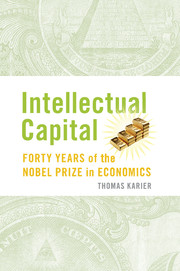Book contents
- Frontmatter
- Contents
- Preface
- Economic Nobel Laureates
- 1 An Economic Prize
- 2 Free-Market Economics
- 3 Micro: The Chicago School
- 4 Stock Market Casino
- 5 More Micro
- 6 Behaviorists
- 7 Keynesians
- 8 Classical Revival
- 9 Inventors
- 10 Game Geeks
- 11 General Equilibrium
- 12 A World View
- 13 Numbers Guys
- 14 History and Institutions
- 15 Reshaping the Prize
- Notes
- Index
3 - Micro: The Chicago School
Published online by Cambridge University Press: 10 November 2010
- Frontmatter
- Contents
- Preface
- Economic Nobel Laureates
- 1 An Economic Prize
- 2 Free-Market Economics
- 3 Micro: The Chicago School
- 4 Stock Market Casino
- 5 More Micro
- 6 Behaviorists
- 7 Keynesians
- 8 Classical Revival
- 9 Inventors
- 10 Game Geeks
- 11 General Equilibrium
- 12 A World View
- 13 Numbers Guys
- 14 History and Institutions
- 15 Reshaping the Prize
- Notes
- Index
Summary
Most of what conventional economists know about markets can be found in the field of microeconomics. Adam Smith launched it in the eighteenth century with his description of market behavior, and Alfred Marshall made it popular in the early twentieth century with a more modern representation of supply and demand. Microeconomics has continued to thrive in universities, and the Nobel Prize has been awarded to one group of economists who translated the basic concepts into higher levels of mathematical abstraction, and to a second group who applied the concepts to problems unrelated to formal markets. This chapter is about the latter, those economists who have won Nobel Prizes by discovering new applications for microeconomics.
Supply and demand, a simple notion, informs many economic models. It easily explains all kinds of basic economic behaviors in all kinds of situations. But microeconomics, especially the perfect competition version, went far beyond that, providing a mathematically precise description of idealized market behavior. Perfect competition relied on simple, but highly abstract, assumptions, namely, a very large number of firms and consumers who act rationally with perfect information. Even firms entering new markets are assumed to know exactly what to do. Under these ideal conditions, it was possible to derive mathematical conclusions about the economy. But what did they actually mean? If the models weren't based on reality, what insights could they provide about the real world?
- Type
- Chapter
- Information
- Intellectual CapitalForty Years of the Nobel Prize in Economics, pp. 34 - 57Publisher: Cambridge University PressPrint publication year: 2010



